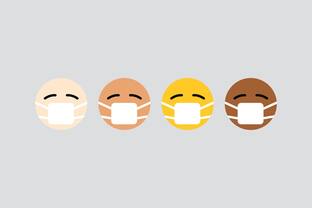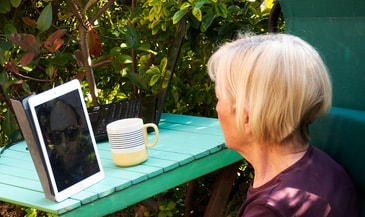People believe that positive thinking is about thinking that "everything will work out great all of the time" it isn't. It is about focusing on the present, what is going well and what they can do to make a situation better. - Will Bowen I wrote a Facebook and Instagram post only a few days ago, about how the level of stress we can handle feels much less than usual for us right now. When we are stressed, it can affect our ability to think rationally and to regulate our emotions, meaning the way we respond to situations is more chaotic or rigid than usual.
It is often the anxiety within us that responds first to stressful situations. It is the body's alarm and survival mechanism. Our body's way of attempting to protect us and response to danger. This happens whether the danger is real, or whether we believe the danger is there when there is none. ( I like to think of it as a button that is pushed when we are in danger that sometimes gets pushed at the wrong times or becomes a little stuck) It's safe to say the Coronavirus has brought for many of us, massive amounts of anxiety, uncertainty and fear Before we know it we can find ourselves caught up in what if statements where our perceptions of situations and circumstances become skewed, developing patterns of thinking that are irrational, they are so subtle that it can be difficult to recognise them. Some of the most common ones are:
The more we can recognise that our thoughts aren’t always helpful, that thoughts are not fact and are often driven by our emotions and the way we feel. I know more about stress and how this can influence my feelings and behaviour now what do I do? Breathe When we are anxious we breathe shorter, shallower breaths so this it a way of calming giving our body the oxygen it needs Step 1: Place your hand on your tummy and breathe in slowly through your nose to fill your lungs with air. Imagining there is a balloon inside your tummy. Every time you breathe in, the balloon inflates. Notice the sensations in your tummy, your tummy rising with the in-breath. Step 2: Now open your mouth and slowly blow all of the air back out of your lungs, when you breathe out the balloon deflates. Allow your tummy to sink. Notice the sensations in your tummy as it falls with the out-breath Remember that thoughts will come into your mind, and that’s okay. We have that covered too! Simply notice those thoughts, you don't have to follow them, judge yourself for having them or analyse them. Let them drift away as you bring your attention back to your breathing. Okay, but I wanted to be able to help myself how can I? Try and create some certainty for yourself with a new temporary routine that will help to calm any anxious gremlins that are going around in our heads. In the morning
During the day
In the evening
We are all individual, and what works for one person may not work for another. Please feel free to take what you need, adapting it to suit you and your needs. If you are accessing support through therapy/ counselling ask if your session can take place online or over the phone. If you would like to discuss this further or anything covered in this blog When people think of therapy/ counselling the image that often comes to mind two people in a room talking (I must give credit where it's due) it can look a lot like that if working face to face but it doesn't have to. Therapy/counselling can and does take place online. Many people have been a little skeptical about working in this way questioning whether it is 'proper' counselling. The journey is totally individual and what works for one person, may not work for you. Whether you have tried face to face counselling and it wasn’t what you were after or it might not feel like an option for you right now, there are other ways to access support. I work via the online and via a webcam. The practical side of it: Telephone counselling is pretty much as it sounds. You can use the zoom software to make calls which is free or use the 'normal’ telephone we can do this, it would mean that you would need to make the call and the costs of these. Webcam Counselling you'll need a device that has a webcam. It could be a laptop/ desktop, phone or tablet with a stable internet connection. If you've ever chatted to family and friends in Facetime it is a lot like communicating in that way. I use Zoom or Vsee which is a confidential platform, accessible either via their website or app. I send out instructions (a step by step guide) on how to do this. I can also send an email link for each session for those of you who prefer not to download apps and software Is this suitable for everyone? Many difficulties people are facing can be worked with online. One of the biggest challenges to working in this way would be a lack of confidence using technology. You will also need to find a safe confidential space where you won't be disturbed for each session you will be meeting with the therapist/counsellor. Many therapists/ counsellors during their initial conversations will give you the opportunity to explore if this feels like the most suitable way of working for you. Why might I decide online counselling as opposed to face to face? There are many reasons people choose online counselling. It offers a solution to various difficulties that can be associated with accessing counselling face to face. Check out my therapy page for more information. Some of the things you might enjoy about online therapy are: • You can create a comfortable and private space in your own home from which to attend therapy. • You may find it easy to talk, focus and express yourself. • You may enjoy wearing comfortable clothes, bringing a cup of tea and avoiding a commute after a therapy session. Your pet is welcome to join you; however, we will need to be mindful of them distracting us (I have a soft spot for pets especially dogs!) • There can be more flexibility with appointments • Support can continue despite the pandemic. What should I look for when choosing a therapist/counsellor who works online? I mentioned in a previous blog that counselling within the UK is not a regulated profession. There are training providers such as ACTO who make sure counsellors have the right training to work online. I am a professional member of their accrediting body, so checking out where therapist/ counsellors trained to work in this way is really important. ACTO (Association for Counselling and Therapy Online) has a list of their members here. Working online has been said to have the same success rate and positive outcomes as face to face counselling but there are definitely differences and things to be mindful of. Please check out my previous blog which covers 10 things to consider when choosing a counsellor. Working with me online. As with all therapy/counselling irrespective of the way it is accessed. I offer a free 20-minute consultation over the telephone to give you the chance to answer any questions you might have. It gives both of us a chance to get to know each other better. A quick chat over the phone means you can see whether you feel a natural 'click'. Don't feel pressured to decide right away take as much time as you need. If you do decide to work with me I will send a contract which talks about how I work confidentiality. There is also an assessment section which helps me to gain a better understanding of where you are at and what you would like to gain from therapy/counselling Still have questions or want to discuss this further |
AuthorDemi Shakespeare
|
Demi Shakespeare Therapy
Integrative therapist, based in Brierley Hill in the Midlands and online,
helping people hear themselves and take action that aligns with their goals.
helping people hear themselves and take action that aligns with their goals.
Copyright © 2020 Demi Shakespeare Therapy


